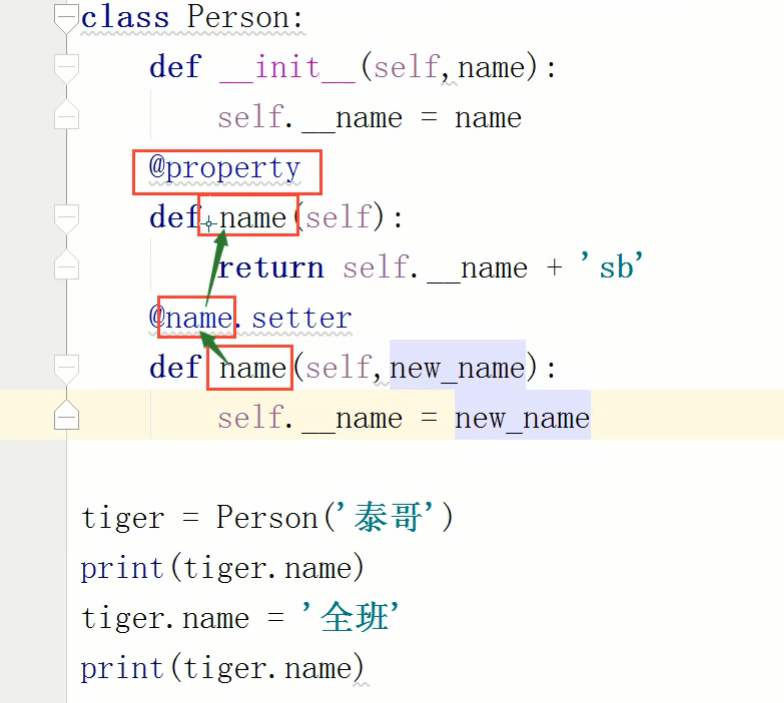class Room: def __init__(self,name,length,width): self.__name = name self.__length = length self.__width = width def get_name(self): return self.__name def set_name(self,newName): if type(newName) is str and newName.isdigit() == False: self.__name = newName def area(self): return self.__length * self.__width jin = Room('金老板',2,1) print(jin.area()) jin.set_name('2') print(jin.get_name())
会用到私有属性这个概念的场景
隐藏起一个属性,不想让类的外部调用
我想保护这个属性,不想让属性随意被改变
我想保护这个属性不被子类继承
# property 内置装饰器函数,只在面向对象中使用 from math import pi class Circle: def __init__(self,r): self.r = r @property def perimeter(self): return 2*pi*self.r @property def area(self): return self.r**2*pi c1 = Circle(5) print(c1.area) #圆的面积 print(c1.perimeter) #圆的周长 78.53981633974483 31.41592653589793
class Person: def __init__(self,name): self.__name = name @property def name(self): return self.__name + 'sb' @name.setter def name(self,new_name): self.__name = new_name tiger = Person('tim') print(tiger.name) tiger.name = '全班' print(tiger.name) timsb 全班sb

class Goods: discount = 0.8 def __init__(self,name,price): self.name = name self.__price = price @property def price(self): return self.__price * Goods.discount apple = Goods('apple',5) print(apple.price)
#删除属性 class Person: def __init__(self,name): self.__name = name @property def name(self): return self.__name @name.deleter def name(self): del self.__name teng = Person('tim') print(teng.name) del teng.name print(teng.name)
class——method
class Goods: __discount = 0.8 def __init__(self,name,price): self.name = name self.__price = price @property def price(self): return self.__price * Goods.__discount @classmethod #把一个方法变成一个类中的方法,这个方法就直接可以被类调用,不需要依托任何对象 def change_discount(cls,new_discount): #修改折扣 cls.__discount = new_discount apple = Goods('apple',5) print(apple.price) Goods.change_discount(0.5) print(apple.price) #当这个方法的操作,只涉及静态属性的时候,就应该使用classmethod 4.0 2.5
staticmethod
# staticmethod class Login: def __init__(self,name,password): self.name = name self.pwd = password def login(self):pass @staticmethod def get_usr_pwd(): usr = input('用户名: ') pwd = input('密码: ') Login(usr,pwd) Login.get_usr_pwd() #在完全面向对象的过程中 # 如果一个函数,既和对象没有关系,也和类没有关系,那么就用staticmethod将这个函数变成一个静态方法
# 类方法和静态方法,都是类调用的
# 对象可以调用类方法和静态方法 ,一般情况下,推荐用类名调用
# 类方法 有个默认参数 cls 代表这个类
# 静态方法 没有默认的参数 就像函数一样
反射
class Teacher: dic = {'查看学生信息':'show_student','查看讲师信息':'show_teacher'} def show_student(self): print('show_student') def show_teacher(self): print('show_teacher') @classmethod def func(cls): print('haha') tim = Teacher() for k in Teacher.dic: print(k) key = input('pls input :') # print(Teacher.dic[key]) func = getattr(tim,Teacher.dic[key]) func() # tim = Teacher() # tim.show_student() # func = getattr(tim,'show_student') # func() # hasattr() getattr() delattr() # if hasattr(Teacher,'dic'): # ret = getattr(Teacher,'dic') #Teacher.dic # ret = getattr(Teacher,'dic') #Teacher.dic # ret2 = getattr(Teacher,'func') # ret2() # print(ret)